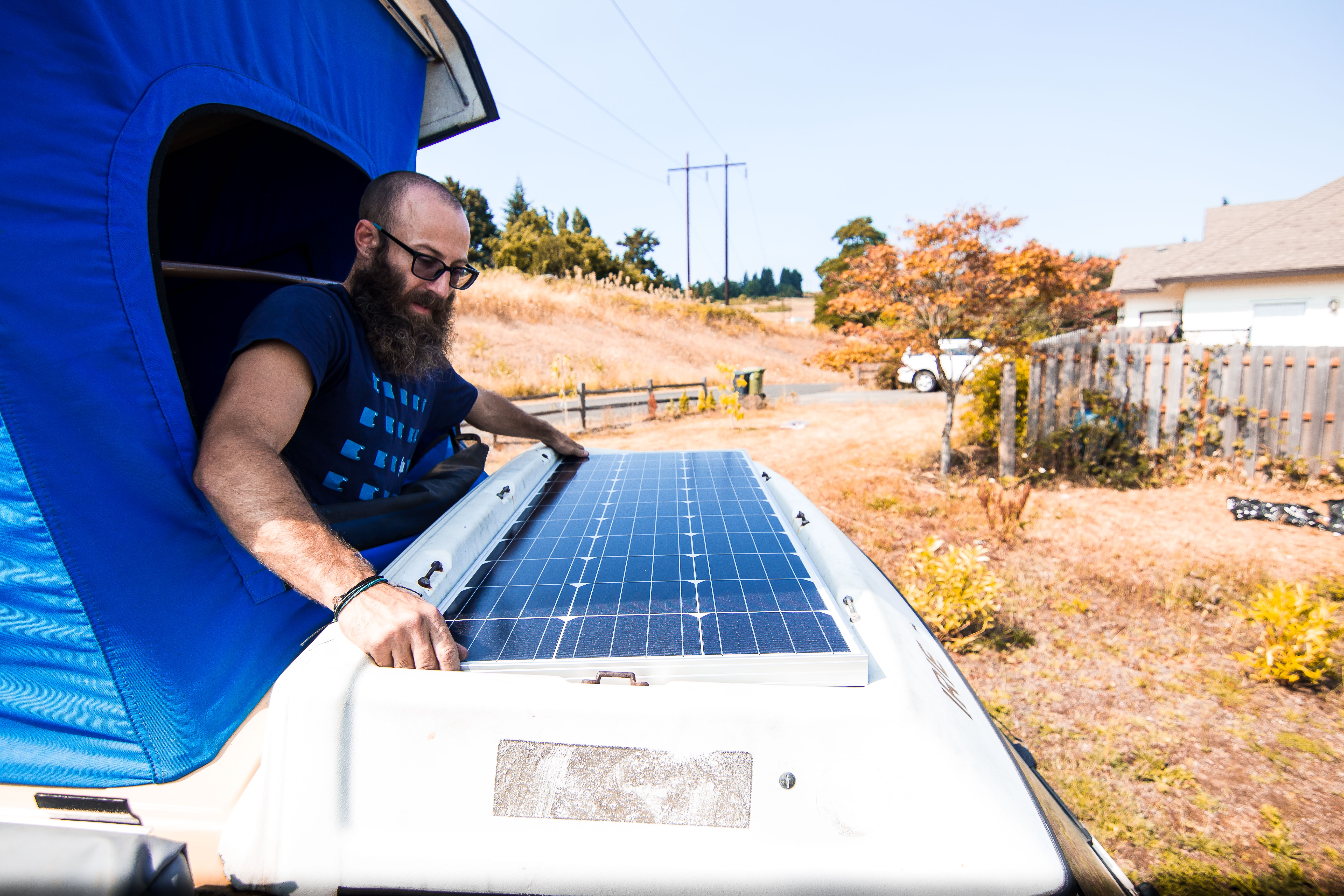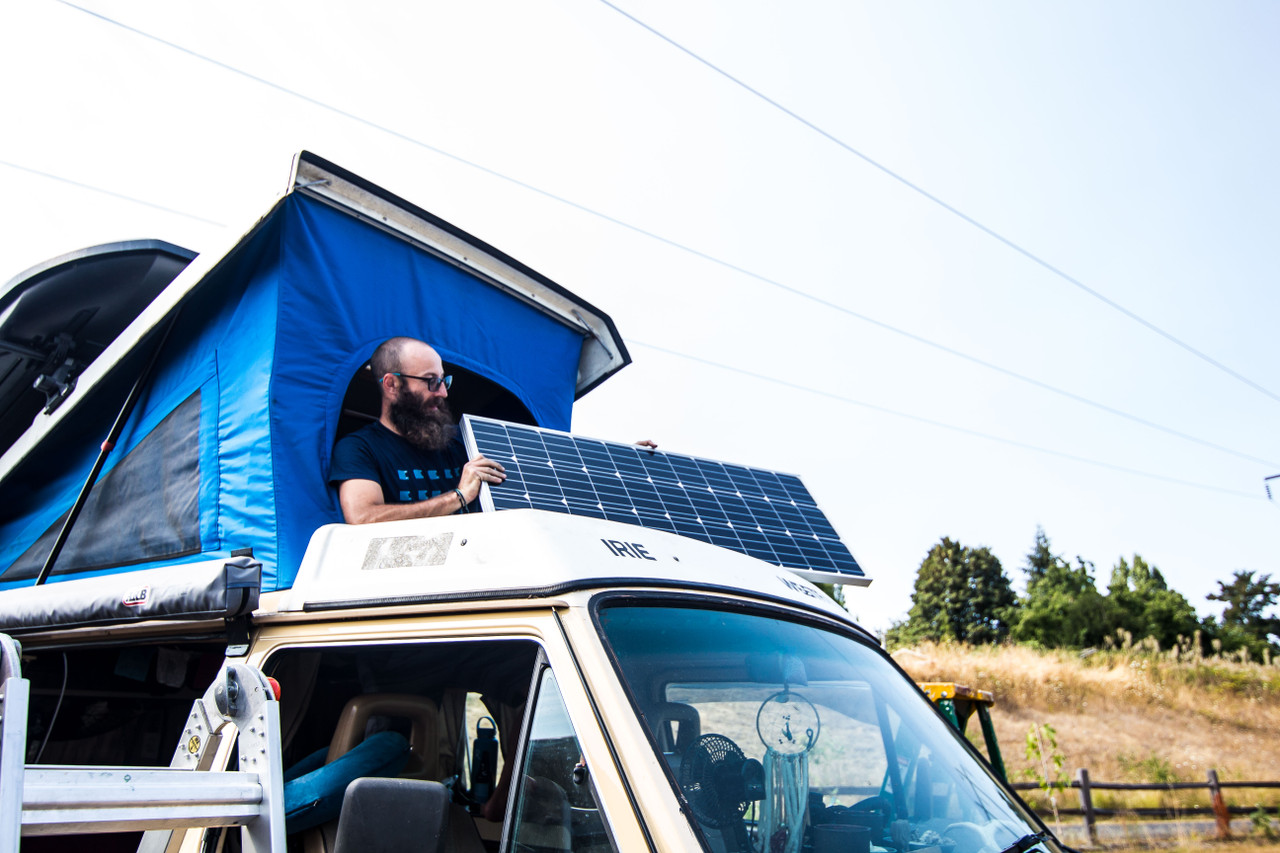What can I power with a 100 watt solar panel?——Calculating how many solar panels you need
One of the best things about solar panels is the wide variety of sizes that are available today. For those that just want to charge their phones or small devices, a 50 watt portable solar panel is a great solution. For those looking for panels to mount on the roof of their off-grid home, installing 300 watt panels is the way to go. And then we have 100 watt solar panels, which for many people is just the right size solar panel. Renogy’s 100 watt 12 volt monocrystalline solar starter kit is designed with solar newbies in mind, without compromising efficiency and advanced technology. Are 100 watt panels enough to meet your energy needs? What’s the best solar panel solution for you?

What can you run with a 100 watt solar panel?
A 100 watt panel that receives 8 hours of sunlight per day will produce almost 1 kilowatt-hours per day. If we multiply this by 365 days per year, we get a solar output of about 365 kilowatt-hours annually. In short, each panel will provide 365 kilowatt-hours each year.
Considering all of the different scenarios, there is still a long list of appliances and devices that can run effectively with 100-watt solar panels, including laptops, fans, and lights.
To get an accurate calculation of what you can and cannot power with a single 100 watt solar panel, you’ll need to compare the output per day or month (so 1 kWh/day for the solar panel) with the needs of an appliance (3.8kWh/day for a refrigerator). In this example, a 100 watt solar panel would not be enough to power that refrigerator. On the other hand, a laptop consumes about 60 watts/hour. That means a 100 watt solar panel would be suitable to meet those needs.
How many amps does a 100w 12v solar panel produce?
To calculate amps, remember the equation amps x volts = watts. In this example, amps x 12 volts = 100 watts. Using this, we learn that a 100 watt panel will produce 8 amps.
How many solar panels do I need to go off-grid?
For the cases of this example, let’s say we have some 100 watt solar panels, and you’re looking to provide power for your home. You don’t have access to the grid and installing off-grid solar on your home is your best option for meeting your energy needs.
Let’s assume that each panel gets around 8 hours of sunlight per day on your rooftop. A 100 watt panel receiving 8 hours of sunlight per day will produce almost 1 kilowatt-hours per day. If we multiply this by 365 days per year, we get a solar output of about 365 kilowatt-hours annually. In short, each panel will provide 365 kilowatt-hours each year. You’ll then take that number and compare it with your energy consumption, which can be calculated with our solar panel calculator.
Do solar panels work in cloudy areas?
A common misconception is that solar panels will not work when it’s cloudy. In reality, solar panels will produce about 25 percent as much energy on a cloudy day as they would on a sunny one. Additionally, solar panels actually operate more efficiently in colder climates than in warmer ones.
If your solar panels are going to be in a place that is fairly cloudy on a regular basis, you’ll want to take that into consideration when calculating how much energy your system will be able to collect. Refer to the Renogy solar calculator to get a more accurate estimate of what size system you need.
What happens at night?
If you have a battery bank, you’ll be able to tap into that excess energy that was produced during the day. Then when it’s cloudy or dark, you’ll have energy to pull from.
How many solar panels do I need to run a refrigerator?
The average refrigerator takes about three or four average solar panels to run. The average refrigerator and freezer uses about 100 Wh per month. A 100 watt panel receiving at least 8 hours of sunlight per day will produce almost 1 kilowatt-hours per day or 30 kWh per month. Divide that usage of the refrigerator (100kWh) by 30 kWh per month and you get 3.3 solar panels. This means you’ll need four 100 watt solar panels to keep that refrigerator running.
How many solar panels does it take to charge a 100ah battery?
This is where that handy equation of amps x volts = watts comes in handy. Charging your battery at 12 volts and 20 amps will take five hours to charge a 100 amp hour battery. By multiplying 20 amps by 12 volts, 240 watts is how big of a panel you would need, so we’d recommend using a 300w solar panel or three 100 watt solar panels.
How do I know how many panels I need?
To determine what size system will best fit your needs, make a list of all the appliances and devices you plan on running. The main appliances to take into consideration when addressing energy needs may include a TV, lighting, water pump, laptop, fans, microwave, and refrigerator. We recommend using the Renogy solar panel calculator to help design your system and calculate your needs.
Conclusion
Renogy’s 100 watt 12 volt monocrystalline solar starter kit is a perfect solution for both those who are new to solar and those who have lower energy needs than a full family home. By combining the ease of a solar kit that includes all the starting essentials for any solar installation (you’ll still need to purchase an inverter and a battery bank) with the ability to charge common devices and appliances, such as laptops, fans, and lights, it’s clear to see why the 100 watt solar panel kit is so versatile and powerful.







